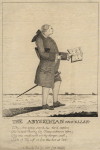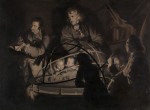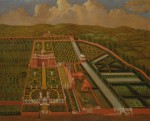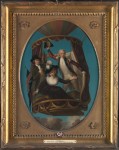This Collection gathers accounts of scholarly work exploring the connections among literature, science, and the arts in the long 18th century. Click Join Us if you would like to contribute to this Collection.
Science Hasn’t Been This Politicized Since 1676
On April 22, a vast cohort of scientists and their allies descended on Washington to take part in the DC March for Science. Researchers and educators, academics and civilians, town and gown, stood together to “express their fealty to reason, data, and, above all, the scientific method,” as a recent New Yorker article put it. Striking back at a Administration that has openly denied scientific consensus on issues such as climate change, even going so far as to purge scientific data from government servers, scientists marched against what seems to many like a sudden and shocking politicization of science. It’s like its 1676 all over again.
“Looking for the Longitude”
Longitude was a hot topic in eighteenth-century Britain. “Looking for the Longitude” brings together a series of images and commentaries to consider how people experienced the longitude debate in eighteenth-century London.
What the Abyssinian Liar Can Tell us about True Stories: Knowledge, Skepticism, and James Bruce’s Travels to Discover the Source of the Nile
In 1773, James Bruce of Kinnaird returned to Europe after a decade of travel and study in North East Africa and Abyssinia (present-day Ethiopia). Initially, the knowledge he brought back with him was favorably received by notable figures like the great naturalist the Comte de Buffon, Pope Clement XIV, King Louis XV, and Dr. Charles Burney, ethnomusicologist, composer, and father of author Frances Burney. But as time went on, the public began to grow suspicious of some of his stories, such as his claims that he had eaten lion meat with a tribe in North Africa or that Abyssinian soldiers cut steaks from the rumps of live cows, then stitched the cows up again and sent them out to pasture.
Agency and Anxiety: On Marie-Hélène Huet’s The Culture of Disaster
Disasters permeate the daily news and saturate our consciousness. This, as Marie-Hélène Huet proposes in a new book, is the way of the modern world.
“An Unknown Arc into the Future”: An Interview with Daniel Lewis, Curator of Beautiful Science: Ideas that Changed the World
Megan Gallagher interviews Daniel Lewis, Curator of the Huntington Library’s exhibit, entitled Beautiful Science: Ideas that Changed the World.
Language and Enlightenment
We might have grown skeptical about our cultural legacy, but it is quite natural for us to assume that our own cognitive theories are the latest word when compared with those of our predecessors. Yet in some areas, the questions we are now asking are not too different from those posed some two-three centuries ago, if not earlier.
Cultivating Philosophy in the Epicurean Garden
The physical garden was to Sir William Temple and other Epicureans a reflection of one’s mental landscape, and in the best of all possible worlds, one would stay in the garden–a position that Voltaire would later and more famously endorse in Candide. Like seventeenth-century definitions of wit, Temple’s philosophy of the garden expresses a balance of judgment and fancy, those gendered faculties of the mind, and an appropriate blend of reason and passion. The act of gardening for Temple was the practice of freeing the self from the disordered passions, unavoidable but capable of being subdued like wild weeds. One needs only a patch of earth, a shovel, and a life of the mind.
“The Good Things Above”: The Commercial Modernity of Vincent Lunardi
In mid-October 1784, two major London newspapers dedicated the poems that were a regular feature on their final page to a set of comic meditations on a unique fashion trend that had developed shortly after the first-ever human flight in England the month before.
Diagrams of Emotion: Hogarth’s Blush and Maori Tattoos
Thomas Willis (1621-1675) thought there were two equal and opposite impulses at work when a person blushed, a modest retreat and an aggressive advance. In his book on mimicry, Dazzled and Deceived (2009), Peter Forbes has argued that all systems…
Erasmus Darwin and the Threat of Materialism
In his two-part medical treatise, Erasmus Darwin—physician, scientist, and inventor—anticipates his grandson Charles Darwin’s evolutionary theory by making a series of startling suggestions.









